You've likely heard about the importance of rabies shots for your furry friend, but do you know how often they need these critical vaccinations? The frequency of these shots hinges on several factors, including your dog's age, health, and even your location. While the cost might seem steep, remember that these shots are invaluable in protecting your dog, yourself, and your community from a potentially deadly virus. So, how do you strike a balance between safeguarding everyone's health and managing your budget? You might find the answer surprising, and it's not as daunting as you might think.
Understanding Rabies in Dogs
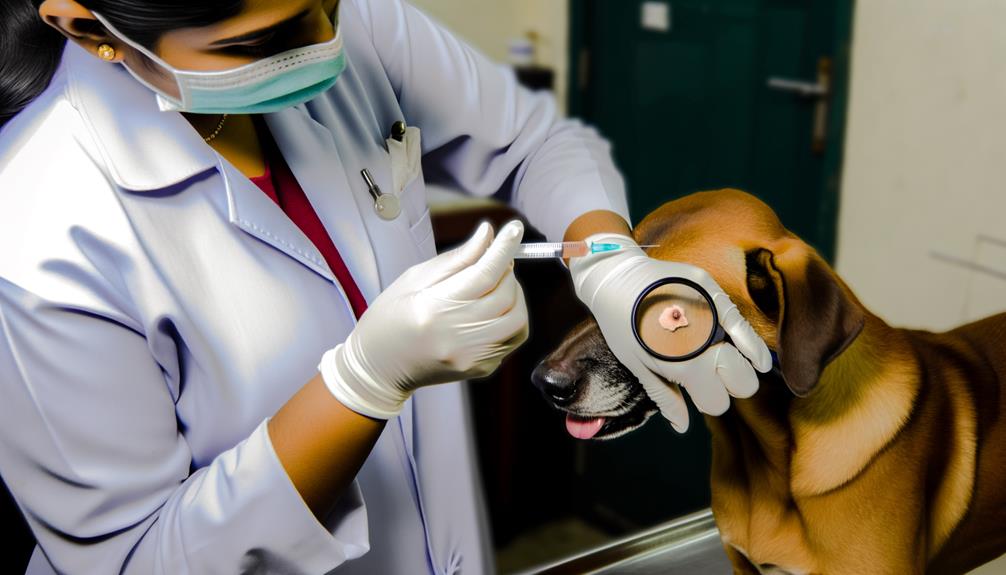
To fully grasp the importance of rabies shots for dogs, it's essential to first understand what rabies is and how it affects our furry friends. Rabies is a deadly virus that targets the nervous system, leading to severe neurological issues and inevitably, death. It's not just about your dog's health, but also your safety, as rabies can be transmitted to humans too.
Now, let's dive into rabies transmission methods. Infected animals can transfer the virus through their saliva, usually by biting another animal or person. Surprisingly, even a tiny scratch from a rabid animal can expose your dog to the virus. That's why it's important to keep a keen eye on your pet, especially when they're playing outdoors.
Prevention, as always, is better than cure. Rabies prevention tips include avoiding contact with wild animals or unfamiliar dogs. Don't let your pet roam free in areas where there's a high risk of encountering a rabid animal. Lastly, remember that the best prevention method is vaccination. Regular rabies shots are crucial to ensure your dog's health and safety. We'll delve further into that in our next subtopic.
Importance of Rabies Vaccination
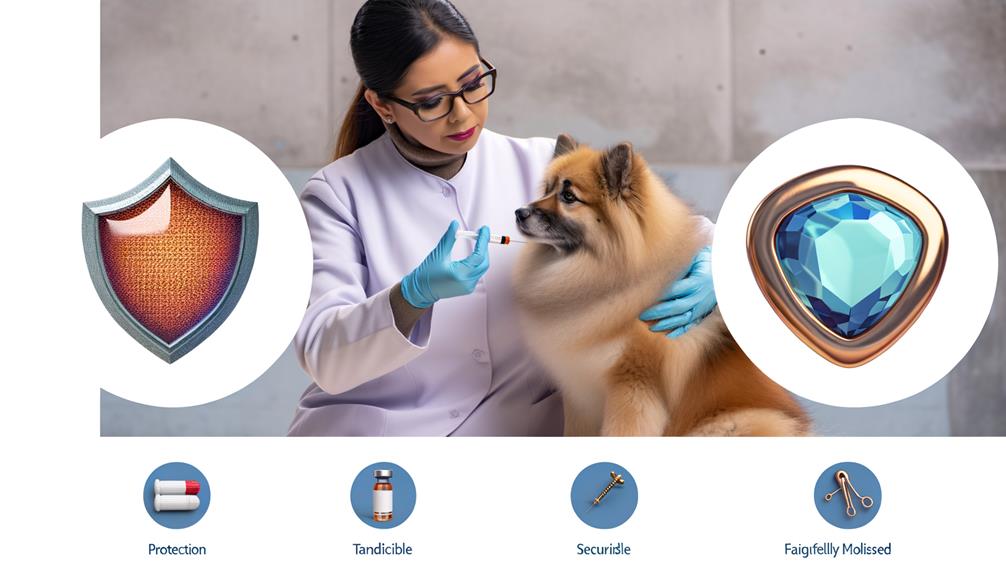
Given the grave consequences of a rabies infection, it's essential that you make rabies vaccination a priority for your dog's healthcare. Protecting your canine companion from this deadly virus is far more than just a legal requirement; it's a matter of life and death.
Rabies is a global problem, causing tens of thousands of deaths every year. The global rabies impact is considerable, with the disease prevalent in over 150 countries and territories. Your dog, if not vaccinated, could be at risk.
Vaccine affordability is another factor that underscores the importance of this preventive measure. Compared to the high cost of treating a rabies infection—which can run into thousands of dollars—the rabies vaccine is relatively inexpensive. The cost-effectiveness of the vaccine is a key reason why it's widely used as a preventive measure against the disease.
Initial Rabies Vaccination Schedule
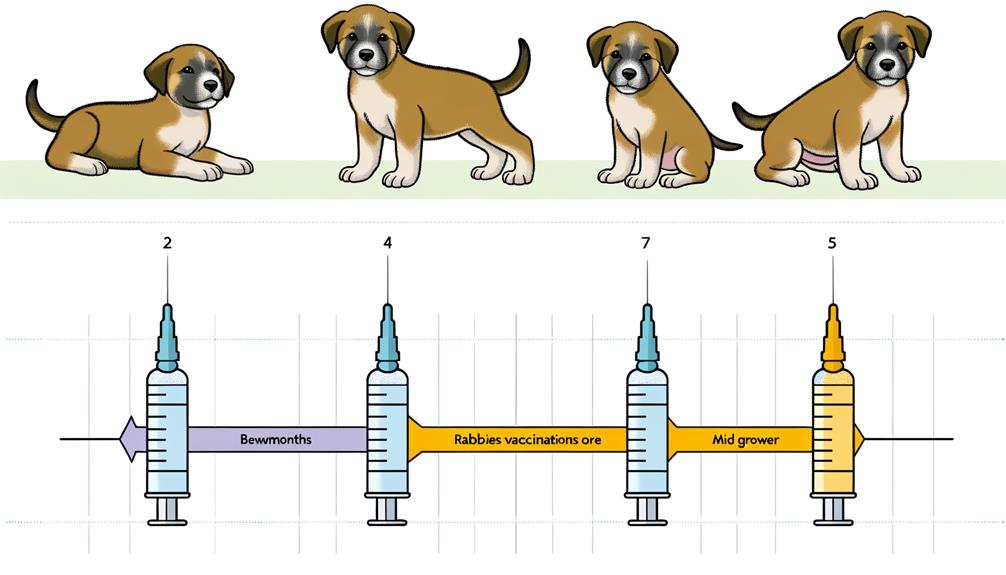
Navigating the initial rabies vaccination schedule for your pup is critical in ensuring their long-term health. This schedule is typically initiated when your pup is about 12 to 16 weeks old. It's essential to note that the age is just the minimum requirement. In some cases, depending on the vet's recommendation and the puppy's health, the first shot may be delayed.
The initial rabies shot is a crucial part of the puppy immunization process. This vaccine contains specific ingredients, designed to stimulate your pup's immune system to generate a protective response against rabies. Understanding these vaccine ingredients can be beneficial as it gives you an idea of what goes into your pup's body.
Here are a few key points to remember:
- The initial vaccine is usually followed by a booster shot a year later.
- Your pup's overall health can influence the timing of the vaccine.
- The vaccine ingredients are safe and beneficial for your puppy's health.
Regular Rabies Vaccination Frequency
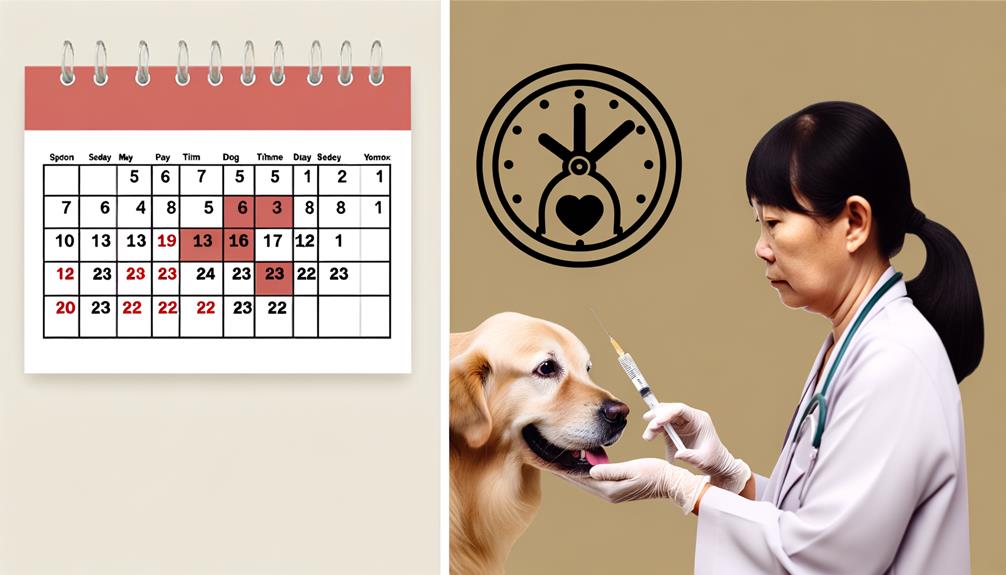
Once your pup has had the initial rabies vaccination and booster, it's crucial to understand the regularity of subsequent shots to maintain their protection against this deadly disease. Usually, after the initial rabies vaccination, your dog will need a booster shot one year later. Following that, rabies vaccinations are typically administered every one to three years, depending on the specific type of vaccine your veterinarian uses and your locale's laws.
The frequency of these shots can have cost implications. More frequent vaccinations obviously mean more visits to the vet, which can add up. However, considering the severe health risks associated with rabies, it's a small price to pay for your pet's well-being.
Now, you may be wondering about vaccine alternatives. Currently, there aren't any alternatives to the rabies shot that provide the same level of protection. Some pet owners consider titer tests, which measure a dog's immunity levels, but these aren't a substitute for vaccinations. They're used more as a check to confirm the vaccine's effectiveness.
Factors Affecting Vaccination Schedule
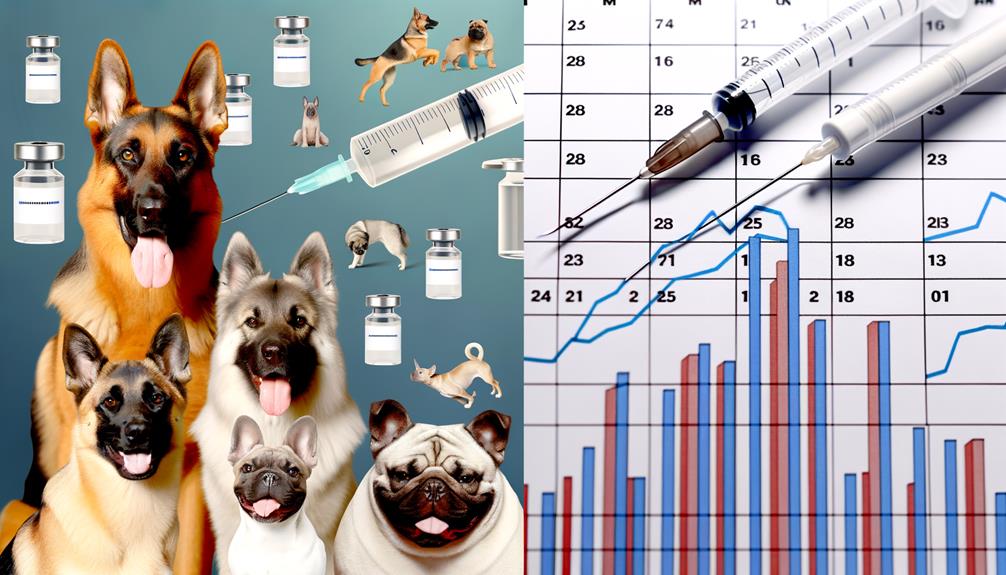
While considering the frequency of rabies shots, it's important to note that several factors can influence your dog's vaccination schedule. These can range from vaccine costs to regional variations and your pet's health condition.
- Vaccine Costs: The cost of rabies vaccines can affect how often you're able to get your dog vaccinated. If you're on a tight budget, you might opt for the essential vaccinations only, which can alter the frequency.
- Regional Variations: Depending on where you live, the prevalence of rabies may be higher or lower, which can influence the recommended frequency of vaccinations. In areas with a high incidence of rabies, more frequent vaccinations might be necessary.
- Your Pet's Health Condition: If your dog has a weak immune system, more frequent vaccinations may be required to ensure they're adequately protected. On the contrary, if your pet is generally healthy, fewer shots might be sufficient.
Bear in mind, these factors are guidelines and the exact schedule should be determined with the help of your vet. They can assess your dog's situation and suggest the best course of action. Always prioritize your pet's health when making these decisions.
Risks of Missing Rabies Shots

If you're skipping your dog's rabies shots, you're playing a risky game. Not only are you exposing your pet to potential health hazards, but you're also potentially facing legal consequences.
Let's look at why missing these shots can be a serious mistake.
Health Hazards of Neglect
Neglecting your dog's rabies shots can put both your pet's life and your health at significant risk. Pet owner negligence is often the root cause of these unvaccinated dog dangers.
Here's what can happen:
- Increased vulnerability: Your dog becomes more susceptible to the rabies virus. This fatal disease affects the brain and spinal cord, causing severe neurological issues.
- Potential transmission: Rabies is a zoonotic disease. If your dog gets infected, it can spread it to you or your family members through a bite or scratch.
- Health complications: In humans, rabies can lead to serious health issues such as fever, headache, and in severe cases, paralysis or death.
Don't gamble with your pet's health or yours. Keep up with the vaccinations.
Legal Consequences of Missed Shots
Beyond the health risks, missing your dog's rabies shots can land you in legal hot water. Legal penalties for not vaccinating pets against rabies vary from fines to severe penalties.
You could be held financially responsible if your unvaccinated dog bites someone. The legal fallout can reach another level in pet custody disputes. If you can't provide proof of rabies vaccination, it might tip the scale against you. Courts may see it as negligence, affecting their decision on your fitness as a pet owner.
Signs Your Dog Needs a Shot
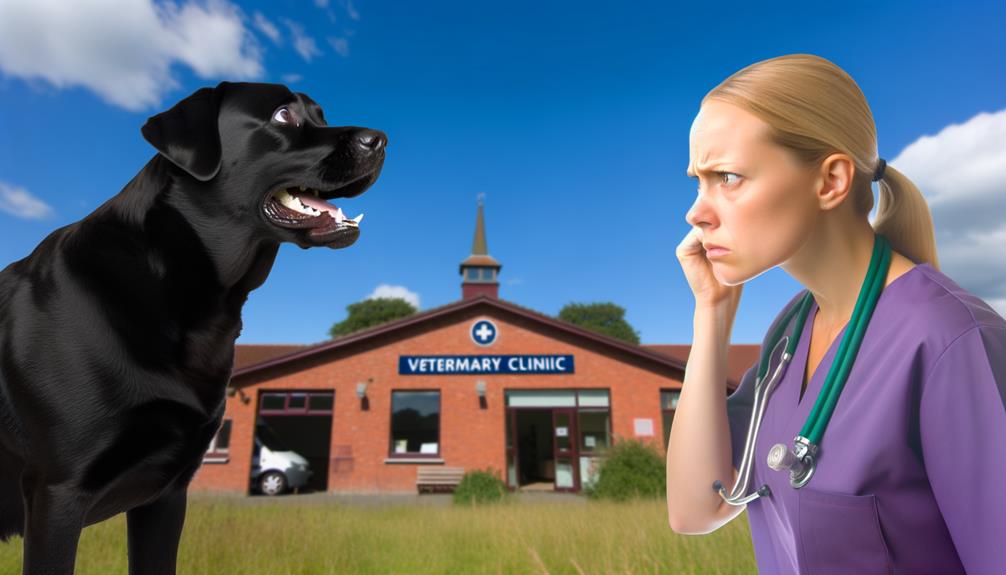
Often, you'll notice clear signs when your dog needs a rabies shot, such as excessive drooling, fever, and sudden behavioral changes. These symptoms may indicate that your furry friend is suffering from vaccine reactions. Regular canine health check-ups can help you spot these signs early and take the necessary action.
But, it's not always that straightforward. Sometimes, the signs can be subtle and easily overlooked. Here are a few other indicators to watch out for:
- Changes in appetite: If your dog is usually a hearty eater but suddenly loses interest in food, it could be a sign of discomfort associated with rabies exposure.
- Unusual aggression: A normally placid dog becoming suddenly aggressive can also be a sign. This could be due to the discomfort or confusion caused by the disease.
- Unsteady movements: Rabies can affect a dog's nervous system, leading to uncoordinated movements or difficulty walking.
Dealing With Possible Side Effects

While it's relatively rare, your dog may experience side effects from the rabies shot. These vaccine reactions can range from mild to severe. Common reactions include fever, loss of appetite, swollen injection site, and lethargy. It's crucial to monitor your dog closely after the vaccination.
Should your dog display allergic symptoms, such as difficulty breathing, swelling around the eyes or face, or sudden diarrhea, it's essential to contact your vet immediately. These signs can indicate a severe allergic reaction, which requires quick medical intervention.
To manage mild side effects, ensure your dog is comfortable and hydrated. Rest is crucial, so provide a quiet space for your pet to recover. However, if symptoms persist or worsen over a couple of days, don't hesitate to seek professional advice. Remember, you know your dog best.
Vaccine reactions, while rare, can be a bit scary. But with the right information, you can confidently handle any potential aftermath of your dog's rabies shot. Your vet is always your best resource, so don't hesitate to reach out with any concerns or questions.
Legal Requirements for Rabies Shots

Now that we've covered possible side effects, let's move on to the legal requirements for rabies shots in dogs. Laws vary by state, but most require regular rabies vaccinations for dogs. You're responsible for ensuring your dog gets its shot administration on time.
However, there are a few exceptions. Vaccine exemptions may apply if your dog has a medical condition that could make the vaccine risky. But remember, getting an exemption doesn't mean your dog is safe from rabies. It just means you're legally allowed to skip the shot.
Consider these points:
- You must provide proof of your dog's rabies vaccination. This is often in the form of a certificate given at the time of the shot administration.
- If you have a vaccine exemption, you'll need to provide documentation from a licensed veterinarian.
- Some states require tags or licenses showing proof of vaccination.
Spreading Rabies Awareness Among Pet Owners

As a pet owner, it's crucial that you regularly educate yourself and others about the importance of rabies vaccination to keep our furry friends healthy and safe. Pet owner responsibilities extend beyond providing food and shelter; they involve safeguarding your pet's health and those around them.
Rabies is a deadly disease, but with awareness and prevention methods, it's entirely avoidable. Vaccinating your pet is the first step in rabies prevention. Regular vaccinations maintain immunity, preventing the disease from taking hold. But it's not just about your pet. It's about community safety too. An unvaccinated pet can become a carrier, putting other animals and even humans at risk.
To spread awareness, start by sharing your knowledge with other pet owners. Discuss the importance of regular vet visits and the necessity of rabies shots. You can also use social media platforms to amplify your message. Encourage your friends and followers to share your posts to reach more pet owners.
Frequently Asked Questions
Can My Dog Have an Allergic Reaction to the Rabies Vaccine?
Yes, your dog can have an allergic reaction to the rabies vaccine. Adverse reactions can be caused by vaccine ingredients. You'll notice symptoms like swelling, hives, or difficulty breathing. Consult your vet immediately.
What Are the Costs Associated With a Rabies Shot for Dogs?
The cost of rabies shots for dogs varies, depending on vaccine efficacy and insurance coverage. You'll typically pay between $15-$20, but it could be covered if you've pet insurance. Always check your policy details.
What Is the Procedure if My Dog Bites Someone Before Getting a Rabies Shot?
If your dog bites someone before getting a rabies shot, you'll face legal implications. You're responsible for the bite treatment costs. It's crucial to get your dog vaccinated immediately to prevent future incidents.
Are There Natural Alternatives to the Rabies Vaccine for Dogs?
While there are herbal immunity boosters and homeopathic vaccinations available, they can't replace rabies shots for dogs. It's critical to follow vet advice for rabies vaccinations to ensure your dog's health and safety.
Can a Pregnant or Nursing Dog Receive the Rabies Vaccine?
Yes, a pregnant or nursing dog can get the rabies vaccine. However, it's crucial to consider vaccine safety during the gestation period. Always consult your vet before making any health decisions for your pet.
Conclusion
So, it's crucial you keep up with your dog's rabies shots.
Rabies is deadly, and the vaccine not only protects your furry friend but it also shields you and others from the virus.
Always consult with your vet about the best vaccination schedule, considering factors like local laws and your dog's health.
Be aware of possible side effects and promote rabies awareness among fellow pet owners.
Your dog's life, and others, could depend on it.







